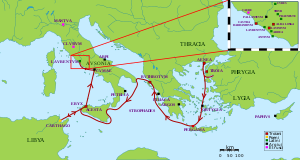ਅਨੀਅਡ


ਅਨੀਅਡ (/ɪˈniːɪd//ɪˈniːɪd/; ਲਾਤੀਨੀ: [Aeneis] Error: {{Lang}}: text has italic markup (help) ਲਾਤੀਨੀ ਉਚਾਰਨ: [ae̯ˈneːɪs]) ਇੱਕ ਲਾਤੀਨੀ ਮਹਾਕਾਵਿ, ਹੈ ਜਿਸਨੂੰ ਵਰਜਿਲ ਨੇ 29 ਅਤੇ 19 ਈਪੂ ਦੇ ਵਿਚਕਾਰ ਲਿਖਿਆ ਹੈ। [1], ਇਸ ਵਿੱਚ ਇੱਕ ਟਰੋਜਨ ਏਨੀਅਸ ਦੀ ਮਹਾਗਾਥਾ ਦੱਸੀ ਗਈ ਹੈ, ਜੋ ਇਟਲੀ ਚਲਾ ਗਿਆ ਸੀ, ਜਿੱਥੇ ਉਹ ਰੋਮਨਾਂ ਦਾ ਪੂਰਵਜ ਬਣਿਆ। ਇਸ ਵਿੱਚ ਡੈਕਟਾਈਲਿਕ ਹੈਕਸਾਮੀਟਰ ਵਿੱਚ 9,896 ਲਾਈਨਾਂ ਹਨ।[2] ਕਵਿਤਾ ਦੀਆਂ ਬਾਰਾਂ ਕਿਤਾਬਾਂ ਵਿੱਚੋਂ ਪਹਿਲੀਆਂ ਛੇ ਟਰੋਏ ਤੋਂ ਲੈ ਕੇ ਇਟਲੀ ਤੱਕ ਏਨੀਅਸ ਦੀ ਯਾਤਰਾ ਦੀ ਕਹਾਣੀ ਦੱਸਦੇ ਹਨ ਅਤੇ ਕਵਿਤਾ ਦਾ ਦੂਜਾ ਅੱਧਾ ਟਰੋਜਨਾਂ ਦੀ 'ਲੈਟਿਨਾਂ' ਤੇ ਆਖਿਰ ਨੂੰ ਜੇਤੂ ਯੁੱਧ ਦੇ ਬਾਰੇ ਦੱਸਦਾ ਹੈ, ਜਿਸਦਾ ਨਾਂ ਹੇਠ ਏਨੀਅਸ ਅਤੇ ਉਸਦੇ ਟਰੋਜਨ ਦੇ ਅਨੁਯਾਈਆਂ ਨੇ ਸਮਾ ਜਾਣਾ ਸੀ।
ਹੀਰੋ ਐਨੀਅਸ ਪਹਿਲਾਂ ਤੋਂ ਹੀ ਗ੍ਰੇਕੋ-ਰੋਮਨ ਦੰਤਕਥਾ ਅਤੇ ਮਿੱਥ ਲਈ ਜਾਣਿਆ ਜਾਂਦਾ ਸੀ, ਜਿਸਦਾ ਇਲੀਅਡ ਵਿੱਚ ਇੱਕ ਚਰਿੱਤਰ ਸੀ। ਵਰਜਿਲ ਨੇ ਏਨੀਅਸ ਦੀਆਂ ਘੁਮੰਤਰੂ ਜੀਵਨ ਦੀਆਂ ਅੱਡ ਅੱਡ ਨਿੱਖੜੀਆਂ ਕਹਾਣੀਆਂ, ਰੋਮ ਦੀ ਬੁਨਿਆਦ ਰੱਖਣ ਨਾਲ ਉਸਦੇ ਅਸਪਸ਼ਟ ਸੰਬੰਧ ਅਤੇ ਇੱਕ ਸਤਿਕਾਰਯੋਗ ਸੂਝਵਾਨ ਵਡਾਰੂ ਹੋਣ ਤੋਂ ਇਲਾਵਾ ਕੋਈ ਨਿਸ਼ਚਿਤ ਵਿਸ਼ੇਸ਼ਤਾਈਆਂ ਨਾ ਹੋਣ ਵਾਲਾ ਪਾਤਰ ਲਿਆ ਅਤੇ ਅਨੀਅਡ ਨੂੰ ਰੋਮ ਦੀ ਸਥਾਪਨਾ ਦੀ ਇੱਕ ਮਜ਼ਬੂਤ ਮਿਥ ਜਾਂ ਕੌਮੀ ਮਹਾਂਕਾਵਿ ਦਾ ਰੂਪ ਦੇ ਦਿੱਤਾ ਜਿਸ ਨੇ ਰੋਮ ਨੂੰ ਟਰੋਏ ਦੀਆਂ ਦੰਦ-ਕਹਾਣੀਆਂ ਨਾਲ ਜੋੜ ਦਿੱਤਾ, ਪੂਨਿਕ ਯੁੱਧਾਂ ਦੀ ਵਿਆਖਿਆ ਕੀਤੀ, ਰਵਾਇਤੀ ਰੋਮਨ ਗੁਣਾਂ ਦੀ ਵਡਿਆਈ ਕੀਤੀ ਅਤੇ ਜੂਲੀਓ-ਕਲੌਡੀਆ ਦੇ ਸ਼ਾਹੀ ਘਰਾਣੇ ਨੂੰ ਬਾਨੀ, ਰੋਮ ਅਤੇ ਟਰੋਏ ਦੇ ਬਾਨੀਆਂ, ਨਾਇਕਾਂ ਅਤੇ ਦੇਵਤਿਆਂ ਦੇ ਵੰਸ਼ ਦੇ ਤੌਰ 'ਤੇ ਮਾਨਤਾ ਦਿੱਤੀ।
ਐਨੀਅਡ ਨੂੰ ਵਰਗਿਲ ਦਾ ਸ਼ਾਹਕਾਰ [3][4] ਅਤੇ ਲਾਤੀਨੀ ਸਾਹਿਤ ਦੀਆਂ ਮਹਾਨ ਕਲਾ-ਕ੍ਰਿਤੀਆਂ ਵਿਚੋਂ ਇੱਕ ਮੰਨਿਆ ਜਾਂਦਾ ਹੈ।[5][6]
ਕਹਾਣੀ
[ਸੋਧੋ]ਅਨੀਅਡ ਨੂੰ ਬੁੱਕ 1-6 (ਐਨੀਅਸ ਦੀ ਇਟਲੀ ਵਿੱਚ ਲਾਤੀਓਮ ਦੀ ਯਾਤਰਾ) ਅਤੇ ਬੁੱਕਸ 7-12 (ਲਤੀਯੂਅਮ ਵਿੱਚ ਲੜਾਈ) ਦੇ ਵੱਖ ਵੱਖ ਵਿਸ਼ਿਆਂ ਦੇ ਆਧਾਰ ਤੇ ਦੋ ਹਿੱਸਿਆਂ ਵਿੱਚ ਵੰਡਿਆ ਜਾ ਸਕਦਾ ਹੈ। ਇਹ ਦੋ ਹਿੱਸਿਆਂ ਨੂੰ ਆਮ ਤੌਰ 'ਤੇ ਓਡੀਸੀ ਦੇ ਭਟਕਣ ਵਾਲੇ ਥੀਮ ਅਤੇ ਈਲੀਅਡ ਦੇ ਯੁੱਧ-ਸ਼ੈਲੀ ਦੇ ਦੋਨਾਂ ਥੀਮਾਂ ਦੇ ਨਿਭਾਅ ਨਾਲ ਹੋਮਰ ਨੂੰ ਮਾਤ ਪਾਉਣ ਦੀ ਵਰਜਿਲ ਦੀ ਅਕਾਂਖਿਆ ਦੇ ਅਕਸ ਦੇ ਤੌਰ 'ਤੇ ਮੰਨਿਆ ਜਾਂਦਾ ਹੈ। [7] ਇਹ, ਹਾਲਾਂਕਿ, ਇੱਕ ਕੱਚੀ ਜਿਹੀ ਸੰਗਤੀ ਹੈ, ਜਿਸ ਦੀ ਸੀਮਾ ਨੂੰ ਧਿਆਨ ਵਿੱਚ ਰੱਖਣਾ ਚਾਹੀਦਾ ਹੈ।[8]
ਇਟਲੀ ਦੀ ਯਾਤਰਾ (1-6 ਕਿਤਾਬਾਂ)
[ਸੋਧੋ]ਥੀਮ
[ਸੋਧੋ]ਵਰਜਿਲ ਨੇ ਆਪਣੀ ਕਵਿਤਾ ਨੂੰ ਆਪਣੇ ਥੀਮ (Arma virumque cano ..., "ਮੈਂ ਹਥਿਆਰਾਂ ਦੇ ਅਤੇ ਇੱਕ ਆਦਮੀ ਦੇ ਗੀਤ ਗਾਉਂਦਾ ਹਾਂ ...") ਅਤੇ ਕਵਿਤਾ ਦੀ ਦੇਵੀ ਦੀ ਅਰਾਧਨਾ ਨਾਲ ਸ਼ੁਰੂ ਕਰਦਾ ਹੈ ਅਤੇ ਸ਼ੁਰੂਆਤ ਦੇ ਬਾਅਦ ਕੋਈ ਸੱਤ ਸਤਰਾਂ ਦੇ ਬਾਅਦ, (Musa, mihi causas memora ...,"ਓ ਕਾਵਿ ਦੇਵੀ, ਮੈਨੂੰ ਕਾਰਣ ਬਿਆਨ ਕਰ ...") ਫਿਰ ਉਹ ਕਹਾਣੀ ਵਿੱਚ ਪ੍ਰਮੁੱਖ ਲੜਾਈ ਦਾ ਕਾਰਨ ਬਿਆਨ ਕਰਦਾ ਹੈ: ਟਰੋਜਨ ਦੇ ਲੋਕਾਂ ਦੇ ਨਾਲ ਦੇਵੀ ਜੂਨੋ ਦੀ ਨਾਰਾਜ਼ਗੀ। ਇਹ ਹੋਮਰਿਕ ਮਹਾਂਕਾਵਿਾਂ ਵਿੱਚ ਉਸਦੀ ਭੂਮਿਕਾ ਦੇ ਅਨੁਕੂਲ ਹੈ।
ਫੁਟਨੋਟ
[ਸੋਧੋ]- ↑ Magill, Frank N. (2003). The Ancient World: Dictionary of World Biography, Volume 1. Routledge. p. 226. ISBN 1135457409.
- ↑ Gaskell, Philip (1999). Landmarks in Classical Literature. Chicago: Fitzroy Dearborn. p. 161. ISBN 1-57958-192-7.
- ↑ "History of Latin Literature". HistoryWorld. Archived from the original on February 15, 2017. Retrieved December 5, 2016.
{{cite web}}: Unknown parameter|dead-url=ignored (|url-status=suggested) (help) - ↑ Aloy, Daniel (May 22, 2008). "New translation of 'Aeneid' restores Virgil's wordplay and original meter". Cornell Chronicle. Retrieved December 5, 2016.
{{cite web}}: Italic or bold markup not allowed in:|publisher=(help) - ↑ Damen, Mark (2004). "Chapter 11: Vergil and The Aeneid". Retrieved December 5, 2016.
- ↑ Gill, N. S. "Why Read the Aeneid in Latin?". About.com. Retrieved December 5, 2016.
- ↑ E.G. Knauer, "Vergil's Aeneid and Homer", Greek, Roman, and Byzantine Studies 5 (1964) 61–84. Originating in Servius's observation, tufts.edu
- ↑ The majority of the Odyssey is devoted to events on Ithaca, not to Odysseus' wanderings, so that the second half of the Odyssey very broadly corresponds to the second half of the Aeneid (the hero fights to establish himself in his new/renewed home). Joseph Farrell has observed, "...let us begin with the traditional view that Virgil's epic divides into 'Odyssean' and 'Iliadic' halves. Merely accepting this idea at face value is to mistake for a destination what Virgil clearly offered as the starting-point of a long and wondrous journey" ("The Virgilian Intertext", Cambridge Companion to Virgil, p. 229).
ਬਾਹਰੀ ਲਿੰਕ
[ਸੋਧੋ]ਅਨੁਵਾਦ
[ਸੋਧੋ]- Perseus Projectਫਰਮਾ:Perseus – Latin text, Dryden translation, and T.C. Williams translation (from the Perseus Project)
- Gutenberg Project: John Dryden translation (1697)
- Gutenberg Project: J. W. Mackail translation (1885)
- Gutenberg Project: E. F. Taylor translation (1907)
- Fairclough's Loeb Translation (1916) Theoi.com (Books 1–6 only)
- The Online Library of Liberty Project from Liberty Fund, Inc.: The Aeneid (Dryden translation, New York: P.F. Collier and Son, 1909) (PDF and HTML)
 The Aeneid public domain audiobook at LibriVoxLibriVox
The Aeneid public domain audiobook at LibriVoxLibriVox The Aeneid public domain audiobook at LibriVox
The Aeneid public domain audiobook at LibriVox
ਟੈਕਸਟ
[ਸੋਧੋ]- Aeneidos Libri XII Latin text by Publius Vergilius Maro, PDF format
- Menu Page The Aeneid in several formats at Project Gutenberg
- Latin Text Online
ਉੱਤਰ-ਲਿਖਤਾਂ
[ਸੋਧੋ]- The Thirteenth Book of the Aeneid: a fragment by Pier Candido Decembrio, translated by David Wilson-Okamura
- Supplement to the twelfth book of the Aeneid by Maffeo Vegio at Latin text and English translation
